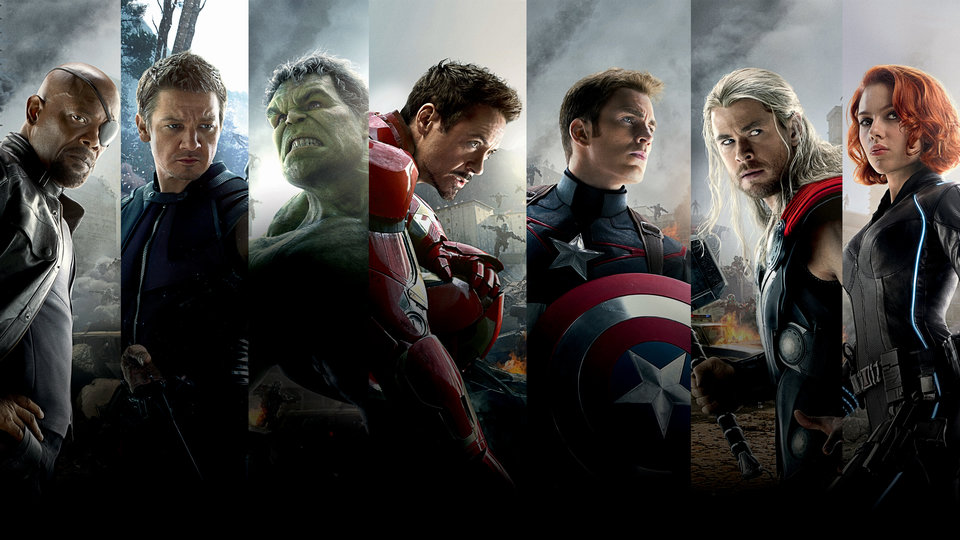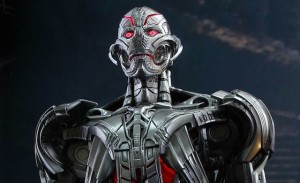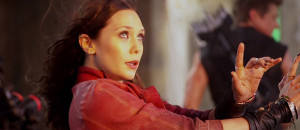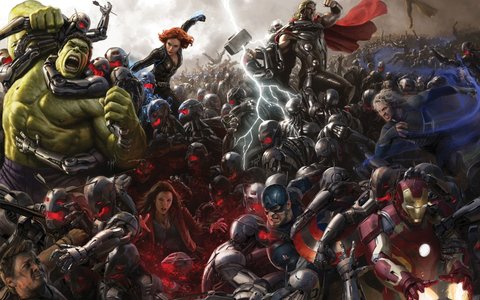Andrew Rostan was a film student before he realized that making comics was his horrible destiny, but he’s never shaken his love of cinema. Every two weeks, he’ll opine on current pictures or important movies from the past.
 One of the questions I wrestle with as both a creative writer and Recorder critic is what makes a story work; determining what a story wants and needs to give its audience and how well it fulfills those objections. The Avengers: Age of Ultron, which for many was the most anticipated film of 2015, offers a complex answer to these questions. The movie has several flaws, ranging from glaring to subtle, that keep it from being fully successful…and I have to balance these flaws with the knowledge that I had a hell of a good time at this movie.
One of the questions I wrestle with as both a creative writer and Recorder critic is what makes a story work; determining what a story wants and needs to give its audience and how well it fulfills those objections. The Avengers: Age of Ultron, which for many was the most anticipated film of 2015, offers a complex answer to these questions. The movie has several flaws, ranging from glaring to subtle, that keep it from being fully successful…and I have to balance these flaws with the knowledge that I had a hell of a good time at this movie.
Too Many Characters, Not Enough Story
To begin as direct as possible: Ultron is not as good as The Avengers, Guardians of the Galaxy, or the other highlights of the Marvel Cinematic Universe, and the root of those problems lies in its particular place as the climax of the so-called “phase two.” By this point, there are a multitude of heroes and villains running around Earth and Asgard, and even more show up for the first time in this movie. In some ways this is a good thing, for Joss Whedon is a master of developing memorable, fully-formed characters, but Whedon is juggling so many introductions and necessary interactions that he loses track of the story.
The other two Marvel “team movies,” the first Avengers and GOTG, both did superb work in showing how the team comes together and how they pursue a villain with clear motivations and a plan to achieve them. Ultron has a lot of fun with the team dynamic, but they never have a conflict between themselves which is dramatic enough to make an audience wonder if the team and the mutual respect they have will survive. Instead, the one true conflict and thus one driving story mechanism is saving the world from Ultron…
And this mechanism is terribly handled. Directly after a really fun opening scene, Tony Stark creates Ultron—an Artificial Intelligence designed to protect Earth from threats. In one minute, Ultron decides that humans are the greatest threat and the only way to protect Earth is to wipe out all humans and let machines rule. It’s a rip-off of The Terminator, but it also comes from the comics and could have been a really well-done story, except Ultron’s decision is made so abruptly as to carry no weight. The first act, where that weight should have been set up, consists entirely of fights and jokes. The rest of the film is Ultron improvising world domination and throwing one challenge after another against our heroes while the Avengers attempt to stop him, in scenes so scattershot that we occasionally forget what city we’re in. This is fine for a Bond movie, but not for a Marvel film where we have come to expect good characterization to accompany the action. When Whedon does finally slow the pace down in the second act, it’s a wonderfully brief respite, but also too little, too late.
 It doesn’t help is that Ultron is not a good villain. James Spader clearly has a hoot voicing it, but its bare-bones motivation is accompanied by the so-inconvenient-it’s-annoying power to zap its consciousness anywhere it chooses. How Ultron works, what its limits are, what truly drove it to seek destruction, are never fully explained, and it only meets up with its true counterpart, the android hero the Vision (played by a terrific but too briefly on screen Paul Bettany) in the final minutes.
It doesn’t help is that Ultron is not a good villain. James Spader clearly has a hoot voicing it, but its bare-bones motivation is accompanied by the so-inconvenient-it’s-annoying power to zap its consciousness anywhere it chooses. How Ultron works, what its limits are, what truly drove it to seek destruction, are never fully explained, and it only meets up with its true counterpart, the android hero the Vision (played by a terrific but too briefly on screen Paul Bettany) in the final minutes.
The Good Is Larger Than Life
But I reiterate that despite these annoyances in the storytelling, Age of Ultron is still a lot of fun. We’ve lived with the MCU long enough to know and love the Avengers, and Whedon’s screenplay’s greatest strength is to play to their strengths. Everyone gets great one-liners and revealing character moments, although three actors in particular stand out.
Scarlett Johansson is marvelous as Black Widow. Her performance has attracted a lot of criticism to the point of being the basis for theories as to why Whedon left twitter, but Natasha Romanoff spends the duration kicking ass, watching her counterparts’ antics with a superior twinkle in her eye, rescuing herself when she gets captured, and bringing a level of gravitas to the film as she deals with her past and trying to do the good things that could clear the red off her ledger. This is exemplified in her mutual attraction to Bruce Banner, the other Avenger who wears guilt on his sleeve. These scenes fall firmly into Whedon’s history of star-crossed lovers, and they work because Mark Ruffalo conveys the sense of Bruce/Hulk being both stronger and weaker (due to his fear) than his partners, and Johansson clearly takes the lead in their dance.
If Robert Downey, Jr. has become the MCU’s wisecracking figurehead, Chris Evans has become its heart and soul. Captain America is the figure we root for the most, the inspiring idealist determined to triumph over evil and his cynical teammates. Evans does all this without being corny, and while both being the butt of jokes and telling some of his own.
 Finally, this film introduces two characters who have been in the Marvel Comics universe since the beginning, the Maximoff twins. While Aaron Taylor-Johnson is charmingly cocky as Quicksilver, Elizabeth Olsen makes a tremendous impression as Scarlet Witch. Wanda Maximoff has a lot in common with Steve Rogers—she volunteered to get her power and she deals with the weight of her past—and the youthful Olsen convinces in the role so much that I hope she will be in the MCU straight on through Infinity War.
Finally, this film introduces two characters who have been in the Marvel Comics universe since the beginning, the Maximoff twins. While Aaron Taylor-Johnson is charmingly cocky as Quicksilver, Elizabeth Olsen makes a tremendous impression as Scarlet Witch. Wanda Maximoff has a lot in common with Steve Rogers—she volunteered to get her power and she deals with the weight of her past—and the youthful Olsen convinces in the role so much that I hope she will be in the MCU straight on through Infinity War.
Beyond the characters, Whedon masterfully directs the action sequences. The third act is better than the New York finale of The Avengers: the visuals are superb, all eleven heroes (yes, the group grows that much by the finale) show off their attributes well, the battle is staged so the audience always knows where they are and what precisely is happening, and in a move that would have Zack Snyder shaking his head in puzzlement, the Avengers’ first priority is to save all the civilians before taking down Ultron, even if it means they will die in the attempt. Moreover, Whedon had to find a way to raise the stakes higher than they are in The Avengers (Loki trying to take over the Earth) but lower than they’ll be in Infinity War (Thanos trying to take over the universe) and I think he does so brilliantly…
What’s Next?
But that speaks to my final problem with The Avengers: Age of Ultron. Ultron has little connection to the grand narrative being told in the MCU, and by the end of the film, all I could think of was how I wished there had been another half an hour in the first two acts to heighten the glory of the third, and then how fantastic it will be for The Avengers: Infinity War to get two parts and be better-paced. There’s something wrong when the end of a movie leaves me feeling less satisfied by its conclusion than excited for another movie coming out three years from now. This is the one giant weakness of the MCU. Creating a ten-year cycle and setting up a spectacular ending means that we’ll have to slog through parts of the middle that CAN’T be as thrilling the finale, and this also builds up expectations for the finale that might never be met.
Unfortunately, Marvel is following up Age of Ultron with the troubled Ant-Man and then Captain America: Civil War, which again is throwing every character possible into a single overstuffed movie. I don’t think the slog will end until we get the third phase (including more GOTG) properly launched with Doctor Cumberbatch.
And I’ll probably still be watching because I’m invested now.
Damn you, Marvel.
Photos from blastr, hypeable, Coming Soon, and Chicago Now.





